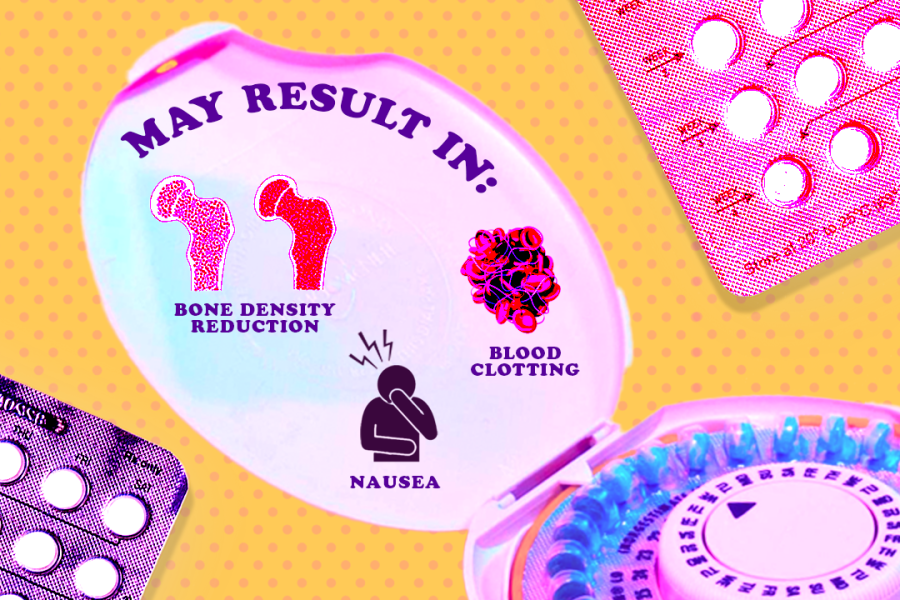Talking about Health: Oral Contraceptives
Birth control pills are unlikely to cause serious effects, but blood clotting and other symptoms are still a risk.
March 27, 2023
Most commonly referred to as the birth control pill, oral contraceptives are used to prevent pregnancy through the intake of various hormone combinations to inhibit ovulation. Oral contraceptives are the most commonly prescribed method of birth control in the United States, making up 25% of those used among women aged 15 to 44. The pill can be up to 99% effective when taken everyday at consistent times.
While side effects of oral contraceptives are likely to be mild and can be mitigated by discontinuation or alternative pill types, those relying on them are warned by doctors and medical providers of more significant physical side effects. Among them is breakthrough bleeding, nausea, abdominal pain, breast tenderness and increased vaginal discharge.
For smaller subsets of people with pre-existing conditions or those of an at-risk demographic, there may be other concerning side effects, including hindered bone mineral density growth and blood clotting. One Danish study found that among use of oral contraceptives in teenagers, there was a minor negative effect on bone mineral density growth and an increased risk of blood clotting.
When considering oral contraceptives, there are health risks associated that could implicate long-term or short-term consequences such as blood clotting and decreased bone mineral density.
A 2011 expert review, published on Medscape, which studied the effects of oral contraceptives on bone mineral density growth through measurements of bone strength, hypothesized that the most at-risk demographic is adult premenopausal women and adolescents. According to their research, young women will gain 40-50% of their skeletal mass during their adolescence, with 90% accumulated by 20 years of age.
Still, science is evolving in this area. The review points to statistical differences in its study that may not be significant enough to describe a direct correlation between the use of oral hormonal contraceptives and bone mineral density. Minor decreases in bone mineral density may also still fall within normal ranges.
In addition to risks regarding bone density and strength, oral contraceptives may impact susceptibility to blood clots that form in veins. According to the British Medical Journal (BMJ), estrogen and progestin, the two hormones found in oral contraceptives, had also been linked to blood clotting, causing a decrease of these hormones in pills since they were first brought on the market in the 1960s.
Blood clotting, also called an embolic event, is not common among those taking oral contraceptives. However, the use of oral contraceptives increases susceptibility to blood clots by 3.8 times according to the Journal of Blood Medicine, depending on the mixed levels of hormone composition in the oral contraceptive of choice. For transgender individuals undergoing feminizing hormone therapy, blood clotting is also a health risk due to the intake of the estrogen hormone.
A study conducted by the BMJ found that those taking oral contraceptives containing a progestin hormone called drospirenone were twice as likely to experience risk of nonfatal blood clotting compared to those taking pills with the levonorgestrel progestin hormone.
Research is changing in that area too: contradicting studies reviewed by an article in the Journal of Blood Medicine point to either an increased risk or even no significant risk of drospirenone progestin intake in oral contraceptives versus other forms of birth control. While there is an increased risk of blood clotting associated with any regular intake of oral contraceptives, the risk is minimal compared to blood clot susceptibility for those experiencing pregnancy or postpartum.
Furthermore, there are other factors that, in combination with the intake of oral contraceptives, can increase the risk of blood clots. This includes smoking, consumption of birth control pills less than 21 days postpartum, and major surgery that results in immobilization.
When considering oral contraceptives, there are health risks associated that could implicate long-term or short-term consequences such as blood clotting and decreased bone mineral density. One can evaluate these risks by consulting a doctor or medical professional about any underlying health concerns that may affect what type of oral contraceptive to intake. Despite these risks, it is important to remember the effective protection that birth control pills afford.

















